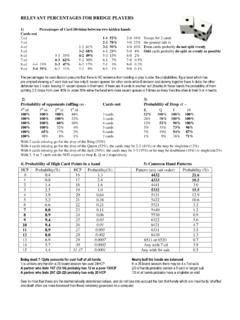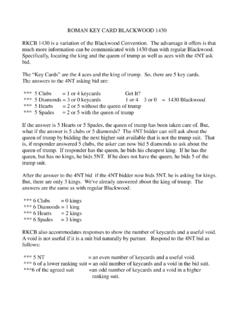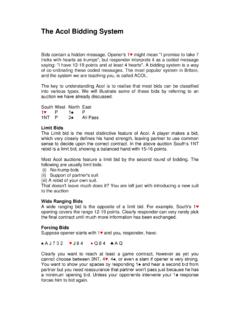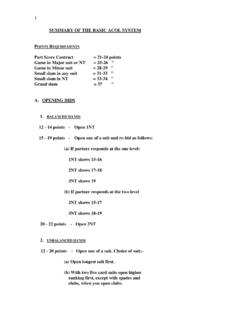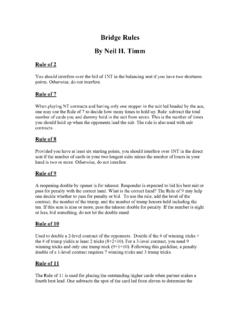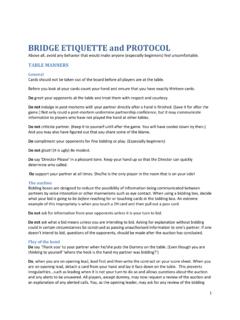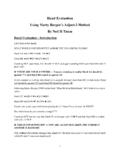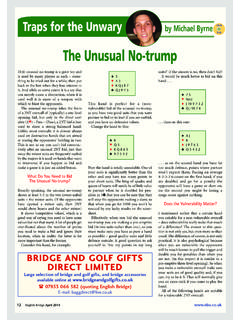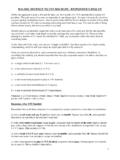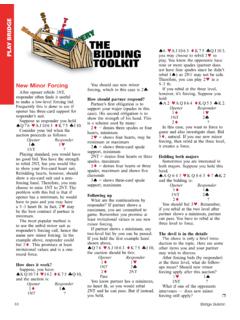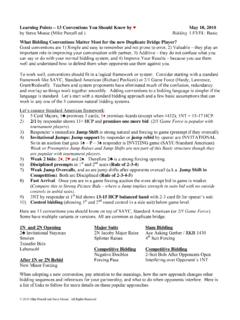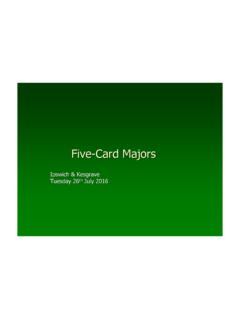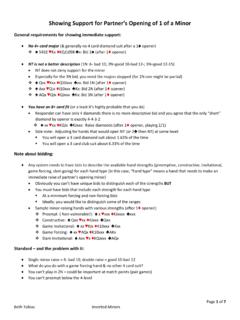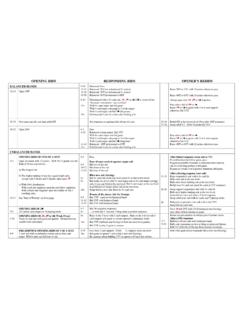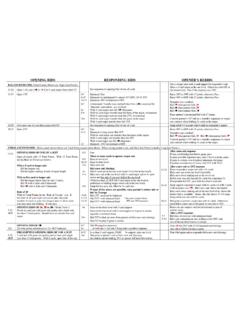Transcription of “Bergen” Raises – An Overview - BridgeWebs
1 bergen Raises An Overview By Neil H Timm Playing the 2/1 Game Force System, when partner opens the bidding one of a major, a bergen Raise is used to show card 4-card support and 7-12 dummy/support points. Marty bergen in explaining the system stated that the jump raise to 3 * diamonds shows 10-12 dummy/support points and the jump raise to 3 * showed 7-9. dummy/support points. This is called the bergen Raise and always shows 4-card support at either level. After the bid of 3 *, the bid of 3 is a help-asking bid. Do you have at least 12 dummy/support points; if so, bid game. Otherwise, pass if hearts is the major bid or bid 3 , if spades is the major suit.
2 Note that again the *=alert. Just when bergen Raises gained popularity, Marty changed his mind and said that 3 *. should show 10-12 dummy/support points and 3 * 7-9-dummy/support points. Naturally this became the Reverse bergen Raise. The Reverse bergen Raise is almost universally used today. Now after 3 *, 3 becomes the help-suit bid. One bids the major at the three-level with less than 12 points and game with 12+ points. With both conventions and only 3-card support for the major, one makes the forcing 1NT. bid (announced as forcing which may conceal a fit and allow the opponents to interfere). and then jump in the major by bidding at the 3-level with a major suit fit.
3 And with 0-6. dummy/support points one bids the major at the 3-level (3 */3 *). Just when you thought you finally could remember the difference between bergen Raises and Reverse bergen Raises , the Combined bergen Raise made an entrance. Although the origin of Combined bergen Raises is not clear, Tommy Solberg credits Pat Peterson for popularizing the treatment in Central New York, the late Max Hardy sounded the first alarm more than10 years ago when he wrote a book entitled Major Suit Raises What's wrong with them and How to Fix Them? He brutally attacked a cornerstone of bridge, Constructive Raises (bid the major at the 2-level with three card support and 8-10.)
4 Dummy/support points), and 1NT (forcing) with 7-9 dummy/support points. In general 1NT-forcing shows 7-12 HCP playing the 2/1 Game Force System since a 2/1 bid shows 13+ points. Because the forcing 1NT bid may conceal a fit, Max Hardy objects to Constructive Raises . To show a fit immediately, Max supports bidding at the 2-level with only 7-9. dummy/support points. After the 2-level bid, he recommends bidding the major at the 3- level (asking for good trumps -3 /3 ). With an A/K/Q one bid 4; otherwise one passes the 3-level bid it is like a help-suit game try in trumps. Using Combined bergen Raises the sequence 1major/3 combines the bergen bids of 3 and 3 and shows 7-12 dummy/support and 4-card support for the major.
5 Opener now bids 3 * asking responder whether he has 7-9 or 10-12 dummy/support points. If responder has the 7-9 raise, he bids 3 * and if he has the 10-12 he bids 3 * spades. This works fine if you opened 1 , since over 3 *, you can bid 3 /4 . But what if you opened 1 , after the bid of 3 *, you are committed to game. Thus, over the bid of one heart, the bid of 3 * becomes the asking bid, NOT 3 . If responder shows a 10-12 limit raise, opener bids game, or if slam is a prospect, can cue bid or ask for responder's controls using, for example, 4NT. Once responder describes his hand, he simply takes his cue from opener, who is the only one who can put the two hands together.
6 Using the bergen or Reverse bergen methods, to show a 10-12-limit raise and 3- card support is to bid 1NT forcing and then jump in partner's bid major. Many times this approach has little preemptive value as opponents have no trouble coming into the bidding over 1 NT responses. With Combined bergen the bid of 3 * is used to show 3- card support for the major bid and 10-12 dummy/support points. What is left? (1) The sequence 1major/2 major shows 3-card support and a good 7-9 dummy/support points. No more needing to use 1NT as forcing, but semi-forcing and may be passed; this is NOT THE CASE with bergen or Reverse bergen Raises .
7 (2) 1 major/3 major is a weak preemptive raise showing 0-6 points. (3) 1 major/4 major shows 5+ card support and very little in outside values or defense. (4) 1 major/1NT forcing can be used with 5-11 and show exactly 2 card support for the bid major. There are players who resist 1NT forcing over major suit openers and prefer a semi-forcing treatment. They complain about never getting the chance to play 1NT when opener has a balanced minimum hand playing bergen or Reverse bergen Raises . To fix this problem, one may agree that if opener has a balanced hand and 12-13. starting points, he may choose to pass 1NT and let responder play it.
8 This must be a partnership agreement and must be announced as semi-forcing (NOT FORCING) and fully explained if asked. Also, responder must be very careful not to bid 1NT forcing with 12 starting points. Interference Over bergen With no interference, the bergen bids are straightforward; however, over double, one-, two-, and three-level bids other options are employed --- there is no standard approach so you should discuss this with your partner. Many players play that bergen Raises are OFF in competition. They are always OFF if you are a passed hand. I now discuss a method suggested by Marty bergen when the opponents double.
9 Since Raises are usually ON. Over a double one may play the BROMAD ( bergen Raises of Major over Double). Convention: 1. A redouble denies in principle 3-card support, but 10+HCP. 2. A response of 2 * is a constructive raise with 8-9 points and at least a 3-card support. 3. A response of 2 * shows a limit raise with a 3-card support. 4. A one level raise is preemptive in nature. 5. Jump Raises are normal bergen Raises with at least 4-card support. 6. A response of 2NT is employed to show a preempt bid with a long minor. However, some use it to show 10+ HCP and 3-card support called Jordon 2NT. In any case, it is almost NEVER Jacoby!
10 For example, playing BROMAD over bergen , one would bid: Opener Overcall Responder Meaning 1 /1 Double 2 * Promises 7-9 points and at least 3-card support. 2 * Promises 10-11 points and at least 3-card support. 2 * Promises between 0-6 points and at least 3-card support 2 NT* Shows a weak hand with a long Minor suit. Opener is forced to bid 3 and the responder may correct to Diamonds. Some use it as Jordon by agreement to show 3-card support. 3 * Promises 7-9 point and at least 4-card support. 3 * Promises 10-12 point and at least 4-card support. 3 * Promises between 0-6 points and at least 4-card support 4 * Promises between 0-6 points and at least 5-card support A disadvantage of this convention is that it eliminates some standard two-over-one bids.
